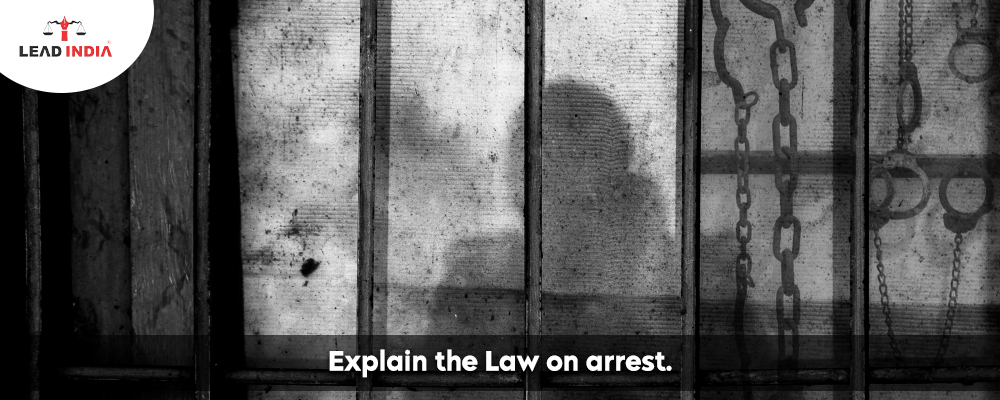However, the Criminal Procedure Code of 1973, which deals with arrests, does not define ‘Arrest’. When a person is arrested, he or she is placed into the custody of a legal authority. The individual is then asked to respond to the charges leveled against him, and he is held to prevent further criminal activity. Sometimes there is legal restraint, but other times the person submits to the custody of the person initiating the arrest on his initiative.
Need A Legal Advice
The internet is not a lawyer and neither are you. Talk to a real lawyer about your legal issue

Law on arrest
- Section 41(1) Cr. P.C states that any police officer may arrest any person who has committed a cognizable offense, has the stolen property, is a state offender, obstructs a police officer in the discharge of his duty, attempts to flee from lawful custody, has been declared deserted from any of the Union’s Armed Forces, is a released convict who breaches his contract of release, and so on
- Section 42 authorizes a police officer to arrest a person for a non-cognizable offense if the subject refuses to provide his name and address.
- Section 43 empowers a private citizen like you and me to arrest someone who commits a cognizable or non-bailable offense in his presence, or who is a declared criminal. Section 44 arrest by the magistrate: According to Section 44(1) of the CrPC, a magistrate has the authority to arrest and commit an individual who has committed an offense in his presence.
- However, Section 45 of the CrPC exempts members of the Armed Forces from being arrested for anything done in the course of their official responsibilities unless they acquire the government’s agreement.
- Section 46 of the CrPC describes how arrests are made, with or without a warrant.
- Section 46(4) provides special protection for females by prohibiting the arrest of women after sunset and before sunrise, except in exceptional circumstances, in which case the arrest can be made by a female police officer after filing a written report and obtaining prior permission from the concerned judicial magistrate of first class within whose local jurisdiction the offense is committed or the arrest is to be made
- A police officer may pursue an individual into any location in India to arrest him or her without a warrant, as stated in Section 48. Section 49 of the Code states that the arrested person shall not be subjected to any needless constraint or physical hardship unless essential to prevent his escape.
- Section 151 empowers police personnel to arrest a person without a warrant on the suspicion that he may commit a cognizable offense. However, certain requirements apply: the expected offense must be cognizable, and the officer must believe that arresting the suspect will prevent the offense. Section 107 grants the magistrate comparable authority.
- Right to Be Informed: Section 50(1) of the CRPC states that a police officer who arrests someone without a warrant must inform the person arrested about the nature of the offense for which he is being arrested. And if the offense he has committed is bailable, it is the police officer’s responsibility to advise the arrested individual that he is eligible for bail and may arrange for sureties on his behalf. Article 22(2) of the Indian Constitution stipulates that the arrested individual must be notified of the grounds of his arrest.
- Right to release on bail: According to Section 50(2) of the CRPC, if the accused has committed a bailable offense, the police officer has the authority to tell the arrested individual of his right to be released on bail. Article 21 of the Constitution stipulates that every person has the right to liberty until and unless proven guilty.
- Right to be brought before a Magistrate without delay: According to Section 56 of the CRPC, the police officer who makes such an arrest, whether with or without a warrant, is required to deliver the accused before a magistrate within 24 hours of his custody, discounting the time spent traveling from the scene of the arrest to the Magistrates Court.
- Right to consult with a legal practitioner: Section 41D of the CRPC grants the accused the right to consult an advocate of his choice, as well as the right to meet with an advocate of his choice during interrogation, but not during the entire interview.
- Right to Free Legal Aid: Article 39A of the Indian Constitution: Free legal aid refers to giving legal services to economically disadvantaged people so that they can pursue a lawsuit or legal procedures in a court of law or before any judicial body or authority.
- Right to an examination by a medical practitioner: According to Section 54(1) of the CRPC, the accused has the right to a full body medical exam. This examination can assist the accused in disproving the offense that he is suspected of having committed or in gathering evidence that someone else committed the offense. However, this can only occur if the magistrate gives authorization.
Lead India provides free legal advice, internet information, and other legal services. We offer a forum where you may talk with a lawyer and ask legal questions. Lead India’s lawyers may assist you with any legal matters. Lead India’s solicitors can help you with any legal concerns. Lead India also offers free online legal help in India. In addition to providing online legal aid, Lead India allows users to ask specialist inquiries for free.





 Talk to a Lawyer
Talk to a Lawyer